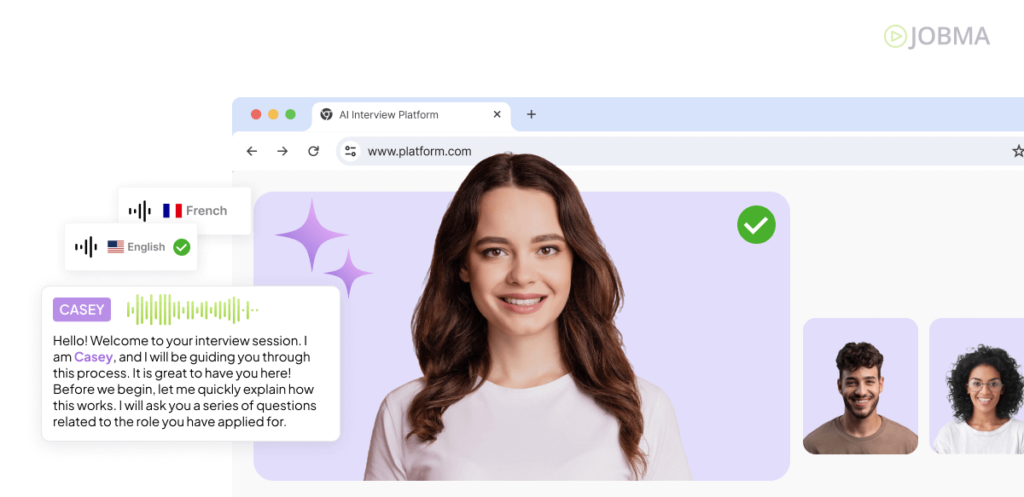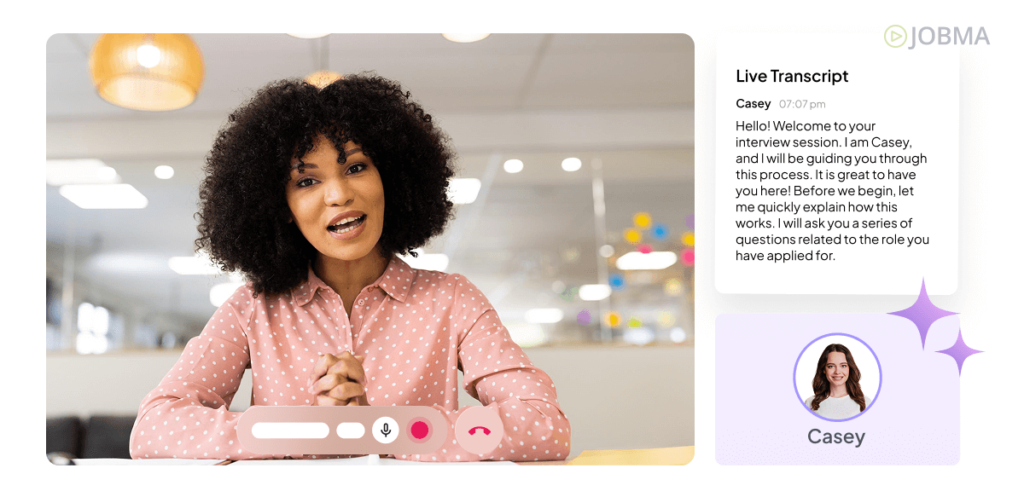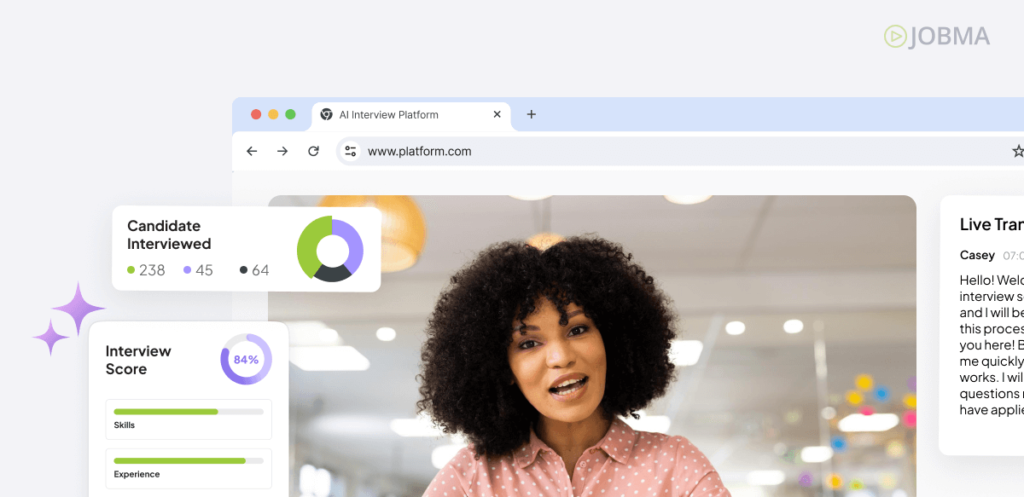Hire Smarter: A Recruiter’s Guide to AI-Assisted Live Interviewing
AI technology is reshaping the hiring landscape. New AI tools are entering the recruitment landscape, and AI-assisted live interviews have taken center stage. In AI-assisted Automated Video Interviews (AVIs), real-time candidate interactions are made possible without involving a live physical interviewer. In this particular interviewing format, AI handles initial screening by asking candidates dynamic, context-aware questions. This new recruitment tool is transforming traditional interviewing, validating candidate competencies, and personalizing the candidate experience.
What Are AI-Assisted Live Video Interviews?
AI-assisted live video interviews leverage advanced artificial intelligence to conduct candidate interviews in real-time. In these interviews, candidates engage in a live, dynamic conversation with an AI assistant instead of a human recruiter. This AI assistant is trained to simulate natural conversation, ask questions aligned with specific skills and job roles, interact in different languages, and get insights about the candidate’s capabilities, expertise, and job readiness.
A one-on-one interaction may not be possible, especially in high-volume hiring or across multiple time zones. In these cases, AI acts as a virtual interviewer, guides the interview, conducts assessments that may or may not be pre-determined by the recruiter, gathering candidate insights through role-specific questions. This dynamic AI interviewer automatically proctors the interview to flag unethical behavior, and translates subject-matter expertise into presentable data for the recruiter.

AI summarizes the entire interaction, including skills demonstrated, communication style, and improvement points, into a comprehensive report for recruiters. While AI handles documentation, initial assessments, and infers key insights, recruiters get access to meaningful recommendations based on the AI-candidate interaction. It eliminates delays from manual information gathering and automates interview scheduling to make hiring fast and accurate.
AI Features that Support Interviewers
AI-assisted interviews enhance candidate interaction by making it more conversational and responsive. The AI engages candidates in real-time conversation using natural language processing (NLP) and machine learning models that adapt based on the interview flow. It asks randomized questions to understand a candidate’s knowledge and problem-solving abilities based on their previous answers, past work experience, and the skills required for a job.
For candidates, the experience feels like a genuine dialogue. Candidates may respond in their preferred language, and AI translates their answers into the recruiter’s chosen language. As the conversation progresses, the AI generates a live transcript of each dialogue, capturing every word and syncing it with timestamps to build an accurate transcript. AI-powered live proctoring and multi-lingual transcripts allow recruiters to access the interaction even though they were not present during the interview.

Based on pre-determined parameters like relevance, clarity, conceptual knowledge, problem-solving, and communication skills, AI evaluates the candidates and scores their suitability for a role. Beyond transcripts and scores, AI can synthesize the entire interaction into easy-to-understand summaries that highlight critical decision points: how well the candidate answered core competency questions, key skills they demonstrated, communication style, and whether they will be a good fit for the position. This makes hiring less of a guesswork that may be prejudiced by individual biases, and makes it more data-driven and objective.

How to use Jobma AI for Candidate Interviews
Conducting AI live interviews with Jobma is a straightforward and user-friendly process. It enables two-way interaction while giving the flexibility of a pre-recorded session. Let’s take a look at how it works.
How Candidates Interact with AI
To set up an AI-assisted live interview, Jobma offers automated interview scheduling features. Candidate can select their interview slot according to their availability and time zone preferences, and receive interview details. This eliminates back and forth between the candidate and the recruiter about the time of the interview.
Candidates receive clear instructions outlining the role of AI in the interview, ensuring transparency. They get to know that the AI’s role is that of an interviewer and support engine, and not a final decision-maker, which builds trust and improves interview performance.
Real-Time Interaction Features
The AI-assisted interview is conducted in real time, where a candidate interacts with an AI assistant present on behalf of a recruiter. With advanced personalization features, AI recruiter can choose how the assistant appears to the candidates, the language they converse in, and its capabilities.
The candidate is required to answer questions around the details from their resume, the requirements of the job, the work they have done so far, and the technical knowledge that may be helpful in the new role. For instance, a candidate for a data analyst role might be asked, “Can you walk me through a project where you used SQL to identify a business opportunity?” Or if the candidate mentions using Python in that project, the AI may follow up with, “How did you validate the results from your Python models?” A candidate applying for a database-focused role might also be asked about tools like a Postgres GUI they have used to simplify queries and manage database tasks efficiently.
The AI algorithm adjusts the difficulty, tone, and flow of the conversation in real time, just like a human interviewer would. This real-time adaptiveness simulates human curiosity and makes the interaction more meaningful. AI then analyzes candidate responses and puts follow-up questions to better gather their expertise, speech clarity, soft skills, and confidence.
How AI Processes the Conversation
AI converts speech into text to generate accurate transcripts. It uses natural language processing capabilities to trace linguistic patterns, keyword usage, clarity of thoughts, and problem-solving skills. The system actively listens and assesses technical knowledge based on job-specific keywords, problem-solving abilities via scenario-based questions, and communication skills, including articulation, structure, and pacing. These are in addition to the rating parameters defined by the recruiters. This back-and-forth continues till the AI assistant has gathered the information needed to complete a comprehensive summary of the interview that reflects the performance parameters.
If any unethical behavior is detected during the interview, AI flags it in the proctoring timeline for foolproof and transparent evaluation. Some of the instances that can be flagged include:
- Multiple face detection to ensure that only the candidate is present.
- Browser tab switching or similar cheating behavior.
- Copy and paste actions, looking away from the screen, etc.
Analytics and Scoring
Once the interview concludes, Jobma’s AI evaluates the candidate’s responses against multiple contextual and recruiter-defined parameters to present them in recruiter notes, summaries, and AI-generated recommendations. Each interview summary includes, AI score with detailed rating for each competency, interview transcript with highlights and notes, AI-generated summary highlighting candidate evaluation, key strengths, areas of improvement, and overall suitability, proctoring timeline with flagged activities with timelines, and overall rating to consider for hiring decision-making. In this process, recruiters can also leverage AI cold email to quickly reach out to top candidates with personalized follow-ups.

This unified scoring framework empowers recruiters to make faster, smarter, and more evidence-based decisions. It also reduces bias by applying standardized evaluation criteria across all candidates, regardless of who they are or where they come from. The recruiters can then use these insights alongside their own observations to make hiring decisions.
Looking Ahead with AI-Assisted Live Interviews
AI-assisted interviews are more than just a convenience – they’re a strategic imperative for modern recruitment. As hiring demands grow more complex, AI can help hiring teams achieve scalability, speed, and fairness without sacrificing quality or candidate experience. This also calls for close monitoring and laying the groundwork for optimal adoption. Setting clear goals you’re trying to achieve through AI is critical.

Ask yourself these foundational questions:
- Is AI an extension of our team’s capabilities or a replacement?
- Are we sharing the information our candidates need to perform their best during their AI live interview?
- How can we utilize AI’s unique features to reduce the burden on our teams so that they can focus more on strategic tasks?
With continuous refinement and ethical use, AI-assisted live interviews can become a cornerstone of efficient hiring. As AI becomes more integrated into recruitment, it’s crucial to view it as an enabler, not a substitute for human judgment.




